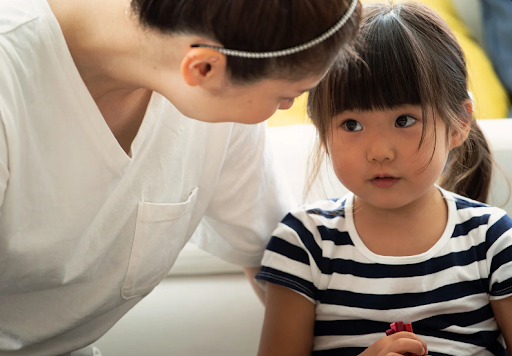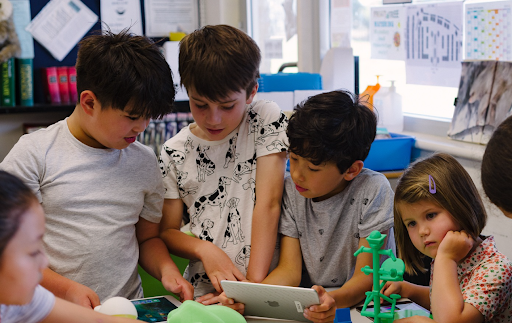Abstract
The Covid pandemic saw an unprecedented surge in voluntary work, bringing into focus once again the importance of inculcating empathy in children. Employers too have realised that fast paced digitization has made it imperative to sensitise and humanise the workforce through empathy training. This can only be done by inculcating empathy in early childhood. Therefore, schools today explore new strategies on how to build empathy in child.
To know what is empathy in child development or why is empathy important in child development, let us first take a look at the story of Abou.
Walking in Another’s Shoes
Who doesn’t know the story of Abou Ben Adam? Every day he used to go out into the streets and help the destitute. One day when he returned at night, he found an angel in his room, writing something. When asked what he was writing, the angel said he was making a list of all those who loved God. Abou asked if his name was there, and was disappointed when the angel said no. The next night when he returned from helping the needy, he found the angel again in his room. The angel said this time he was making a list of all those whom God loves. Abou asked hopelessly if his name was there in this list, and the angel smiled and said, “You’re topping the list!”
I like this story not only because of the obvious moral lesson, but also because of the character of Abou. It would have been easier for Abou to just send some cash to the State Homeless Fund or the Destitute Welfare Fund or some such charity! But he didn’t do that. He went out and sought out deserving people, and personally took care of them. Not many people do that.
At the height of the Covid pandemic, however, there were many who stepped out of their comfort zone and offered help to the suffering, freely and unreservedly. And we are not talking about the medical workers who of course were paragons of selfless service, and continue to be so even now. Here, we are talking about ordinary people, the tea vendor on the beach, the auto driver on the road, the young student next door – people who never were “heroes” or “heroines”, and never aspired to be one. People like you and me. No one urged them, no one coaxed them, no one compelled them. And yet, there they were, right in the middle of the action at a time when prevention and cure were both unknown, doing whatever they could to help, risking their own lives, and with no thought of a reward.But why exactly did they go out of their way to help those in need? What motivated them to step up and volunteer their services? What made them understand another’s pain and helplessness to do what many did not, when disease was rampant and contagion a certainty? To my mind, the one quality that drives such unsung heroes is empathy. The ability to walk in another’s shoes, to feel the pain of another.
How to build empathy in child?
It’s not a unique thing only they have. All of us possess empathy, but to unequal degrees. For some, it doesn’t take a second thought to open that wallet and give for charity because they can empathise with anyone easily. For some others, it takes a little more effort, and they need to delve deeper to find that well of humanity. The good news is that empathy is something that can be taught. Even the hardest heart can be trained in the gentle art of empathising with the less fortunate.
Why is empathy important in child development
Empathy is crucial, and it may help you achieve both personally and professionally. Like most talents, it can be developed with practice. Empathy aids in the formation and maintenance of social bonds. Having a network of friends is advantageous in and of itself. Emotional support is a crucial protective component when coping with stress, according to research. Having social ties is connected to many areas of health and wellness, according to research.
How we build empathy in children?
Schools like TRINS have made it a priority and utilise each and every opportunity to make students empathetic. What makes the TRINS initiative distinctive is the fact that the student is given the opportunity to get personally involved, and take ownership of the act of charity. The TRINS Social Service Club [link?] gets students to engage in hands-on activities to help the needy. The rice collection drive where students literally, physically, bring rice and distribute to the needy is an example. Students and parents often ask, “Can’t we just give money?” It might be far easier, perhaps, to contribute some money and get some shop to deliver the rice.
But at TRINS we believe that nothing can equal the joy one gets from taking the trouble to procure the rice oneself, taking it personally to the beneficiaries, and seeing their happiness in person. As far as students are concerned, contributing money would just mean telling their parents about it, the parent opening his wallet and the money being brought to school and handed over to the teacher. Though well intentioned and sincere, the act of charity becomes almost as casual as a trip to the neighbourhood store, and gives no opportunity for the student to understand the hardships of the disadvantaged.
TRINS believes in instilling in pupils a sense of awareness and care for the well-being of society. The school features a comprehensive social service programme that instills a sense of community among the students. TRINS grade 11 students teach English and IT skills to primary school pupils once a week in local government schools. As a consequence, at the end of the year, the youngsters are able to communicate in basic English. The pupils form a real friendship, setting the road for them to live their lives as unselfish persons.
Students from all throughout the school give rice, oats, milk powder, and other necessities to terminally sick patients at Chavara’s Palliative Care Centre. Students also come to the centre to connect with the patients and spend some time with them, allowing them to better understand and sympathise with people who are in need.
Similarly, instead of merely contributing books and stationery to underprivileged schools in routine mechanical charity, when the TRINS student goes to conduct special, remedial classes for the students of those schools, it is an eye opening and heart-warming experience for our students, the impact of which will be lifelong. They learn to value their privileged life and, at the same time, to empathise with the less fortunate. TRINS students who visit the patients at RCC, Trivandrum, not only contribute to the latter’s physical wellbeing, but also gain an insight into their lives for the time they spend together. It is such students who grow up into the selfless volunteers the whole world is applauding in these troubled times.
These are times when corporate employers have realised that people skills are as essential as digital skills to create happy workplaces, leading in turn to enhanced productivity. EQ has finally become as valued as IQ. It is none other than Satya Nadella, Microsoft CEO, who says “The source of all innovation is what is the most humane quality that we all have, which is empathy”. TRINS, which places extraordinary emphasis on corporate social responsibility and on grooming warm, generous human beings, has risen to the occasion.
Empathy begins at home, they say. But more so at school, if you are a Trinsian.






